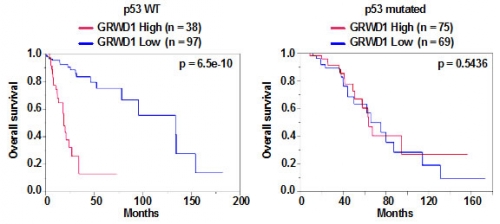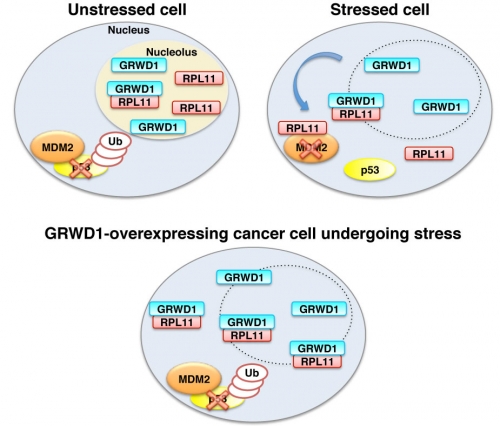研究成果 Research Results
- TOP
- News
- Research Results
- Finding out the novel oncogene GRWD1
Finding out the novel oncogene GRWD1
2016.11.18Research ResultsLife & Health
The p53 is an important tumor suppressor protein. When cells undergo various stresses such as DNA damage, p53 promotes repair of the damage or kills cells when the damage is too severe to repair it. RPL11 binds and inhibits MDM2 ubiquitin ligase that degrades p53, thereby increasing p53. Thus, RPL11 acts as a tumor suppressor. We here show that GRWD1 physically and functionally interacts with RPL11. Inhibition of GRWD1 increases p53 induction, whereas overproduction of GRWD1 reduces p53 induction in cells. Furthermore, GRWD1 overproduction competitively inhibits the RPL11-MDM2 interaction and alleviates RPL11-mediated suppression of MDM2 activity toward p53. Finally, we show that GRWD1 overproduction in combination with HPV16 E7 and activated KRAS confers tumorigenic capacity on normal human fibroblasts. Consistent with this, GRWD1 overexpression is associated with poor prognosis in cancer patients (Fig. 1). Our results suggest that GRWD1 is a novel negative regulator of p53 and a potential oncogene (Fig. 2).
For more information about this research, see the paper below.
EMBO Reports, Kayama et al. GRWD1 negatively regulates p53 via the RPL11-MDM2 pathway and promotes tumorigenesis.

High expression of GRWD1 is associated with poor prognosis of brain lower grade glioma patients with normal p53 but not with mutated, abnormal p53.

RPL11 functions as a tumor suppressor by binding and inhibiting MDM2 that degrades p53. This study shows that GRWD1 is a novel oncogene that binds to RPL11, counteracts RPL11-mediated suppression of MDM2, and thereby inhibits p53.
Journal Reference
GRWD1 negatively regulates p53 via the RPL11–MDM2 pathway and promotes tumorigenesis, ,EMBO Reports, 10.15252/embr.201642444Research-related inquiries
- TOP
- News
- Research Results
- Finding out the novel oncogene GRWD1































